
February 11
1778 Voltaire is welcomed home by some 300 people after a 28-year exile:
Born Francois-Marie Arouet to middle-class parents in Paris in 1694, Voltaire began to study law as a young man but quit to become a playwright . . . . and also wrote poetry. In 1717, he was arrested for his satirical poem La Henriade, which attacked politics and religion. Voltaire spent nearly a year in the Bastille as punishment.
Voltaire's time in prison failed to dry up his satirical pen. In 1726, government disapproval of his work forced him to flee to England. He returned several years later and continued to write plays. In 1734, his Lettres Philosophiques criticized established religions and political institutions, and he was again forced to flee: . . . . to the region of Champagne, where he lived with his mistress and patroness, Madame du Chetelet. In 1750, he moved to Berlin on the invitation of Frederick II of Prussia and later settled in Switzerland, where he wrote his best-known work, Candide. After 28 years, he returned to Paris and was greeted by hundreds of intellectuals.
He died in Paris in May 1778.
1918 Various:

World War I: Addendum to the Fourteen Point Plan publicly announced by President Wilson:
After all, the test of whether it is possible for either Government to go any further in this comparison of views is simple and obvious. The principles to be applied are these: First, that each part of the final settlement must be based upon the essential justice of that particular case and upon such adjustments as are most likely to bring a peace that will be permanent; Second, that peoples and provinces are not to be bartered about from sovereignty to sovereignty as if they were mere chattels and pawns in a game, even the great game, now forever discredited, of the balance of power; but that Third, every territorial settlement involved in this war must be made in the interest and for the benefit of the populations concerned, and not as a part of any mere adjustment or compromise of claims amongst rival states; and Fourth, that all well-defined national aspirations shall be accorded the utmost satisfaction that can be accorded them without introducing new or perpetuating old elements of discord and antagonism that would be likely in time to break the peace of Europe and consequently of the world. A general peace erected upon such foundations can be discussed. Until such a peace can be secured we have no choice but to go on. So far as we can judge, these principles that we regard as fundamental are already everywhere accepted as imperative, except among the spokesmen of the military and annexationist party in Germany.
1918 Russia's General Kaledin commits suicide:
Russian General Alexei Maximovitch Kaledin, a commander of Russian forces during World War I and a staunch opponent of the Bolsheviks, commits suicide on this day in 1918. [For further information, click here]
1919 Weimar: Various:

Friedrich Ebert is elected first president of the German republic: He will help bring about the Weimar constitution that will try to unite Germany after World War I.
I will administer my office not as the leader of a single party, but I belong to the Socialist Party and cannot forget my origin and training. The privileges of birth already have been eliminated from politics and are being eliminated from social life. We shall combat domination by force to the utmost from whatever direction it may come. We wish to found our State only on the basis of right and on our freedom to shape our destinies at home and abroad. However harsh may be the lot threatening the German people, we do not despair of Germany's vital forces.
Erich Ludendorff on the new German government:
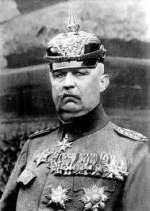
The power of the state failed, as nobody can doubt, because in its external and internal policy, before and during the war, it had not recognized the exigencies of the struggle for existence in which Germany has always been involved. It had demonstrated its inability to understand that politics is war and war is politics. The situation into which the German Empire drifted was not attributable to its constitution—the same constitution which existed in the days of Bismarck—but was caused by the members of the state themselves. They understood neither history nor the signs of the times, nor could they, prepossessed, as they were, in favour of international and pacifist ideas, begin to realize that, in view of the turn of mind of other nations, power in the hand of a strong government is the only means of securing the liberty and well-being of a people; that only the power of the state can prevent criminal confusion within and guard against slavery imposed from without.
1920 Various:
Romania: Corneliu Codreanu and labor leader Constantin Pancu forcibly seize a factory from the Communists. (THP)
Birth: Farouk I: King of Egypt from 1936 to 1952:
Son and successor of King Fuad I, [he] was educated in Egypt and England before ascending the throne in 1936. . . .
After the outbreak of World War II, Farouk tried to maintain neutrality, despite the presence of British troops in Egypt, but in 1942 the British forced him to name as prime minister the Wafd leader Muá¹£á¹afa al-Nahas Pasha. In October 1944 Nahas negotiated the Alexandria Protocol, a step toward the creation the following year of the Arab League, a regional organization of Arab states. Farouk wanted to place himself at the head of this movement, and he dismissed Nahas, who had lost the support of the British.
Egyptian nationalism suffered from a shattering defeat at the hands of the newly created state of Israel (1948) and from the failure to terminate British military occupation of Egypt. The military defeat especially enraged many Egyptian army officers, who saw Farouk's corruption and incompetence as being largely the cause of it. His activities became intolerable in 1952, and the Free Officers, led by Gamal Abdel Nasser, overthrew his regime in July and forced him to abdicate. He was succeeded by his infant son, Fuad II, but less than a year later Egypt became a republic. [For further information, click here.]
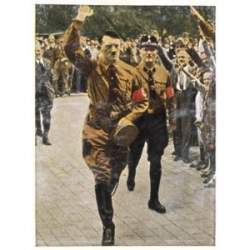
1927 Weimar: Hitler and Goebbels speak at Pharus Hall in Berlin.

1929 The Lateran Treaty is signed by Benito Mussolini for the Italian government and Cardinal Pietro Gasparri for the papacy. It settles the vexatious question of the relationship between the Holy See and Italy. The papacy accepts the loss of the Papal States, while Italy recognizes the Vatican City as an independent state. A financial settlement is also involved.
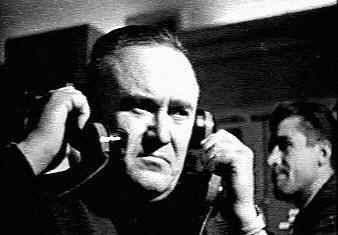
1931 Wunderwaffen: Sergey Korolyov (above, as he will look in the 1950s), together with space travel enthusiast Friedrich Zander, founds the Jet Propulsion Research Group (GIRD), one of the earliest state-sponsored centers for rocket development in the USSR. In May 1932 Korolyov will be appointed chief of the group. (Harford) [See: Wunderwaffen: Hitler's Deception and the History of Rocketry.]
1934 Holocaust: Austria: The Antisemitenbund (Antisemitic Association) sets out its anti-Jewish program. [See: Austria: The Other Germany.]
1938 Austria: From Alfred Jodl's Diary:
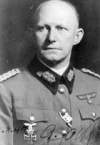
In the evening and on 12 February General K (Wilhelm Keitel) with General Von Reichenau and Sperrle at Obersalzberg. Schuschnigg, together with G. Schmidt are being put under the heaviest political and military pressure. At 2300 hours Schuschnigg signs protocol.
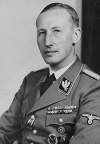
1939 Holocaust: At the first meeting of the Reich Central Office for Jewish Emigration, Heydrich orders officials to proceed as if an agreement with the intergovernmental committee does not exist. (THP)
1940 World War II: A further trade and economic agreement is signed on behalf of the Reich and the USSR. (See Feb 26)
1941 Death: Rudolf Hilferding: German economist, Minister of Finance SPD, by suicide. Hilferding also participated in the Crises Debate: disputing Marx's theory of the instability and eventual breakdown of capitalism on the basis that the concentration of capital is actually stabilizing. His most famous work was Finance Capital.
1942 Various:
World War II: The "Channel Dash":

On this day, the German battleships Gneisenau and Scharnhorst, as well as the heavy cruiser Prinz Eugen, escape from the French port of Brest and make a mad dash up the English Channel to safety in German waters. The Gneisenau and Scharnhorst had been anchored at Brest since March 1941. The Prinz Eugen had been tied to the French port since the Bismarck sortie in May 1941, when it and the battleship Bismarck made their own mad dash through the Atlantic and the Denmark Strait to elude Royal Navy gunfire. All three were subject to periodic bombing raids—and damage—by the British, as the Brits attempted to ensure that the German warships never left the French coast. But despite the careful watch of British subs and aircraft, German Vice Admiral Otto Ciliax launched Operation Cerberus to lead the ships out of the French port. The Germans, who had controlled and occupied France since June 1940, drew British fire deliberately, and the Gneisenau, Scharnhorst, and Prinz Eugen used the resulting skirmish as a defensive smoke screen. Six German destroyers and 21 torpedo boats accompanied the ships for protection as they moved north late on the night of February 11. In the morning, German planes provided air cover as well; ace pilot Adolf Galland led 250 other fighters in an unusually well coordinated joint effort of the German navy and Luftwaffe. The British Royal Air Force also coordinated its attack with the Royal Navy Swordfish squadron, but a late start—the RAF did not realize until the afternoon of February 12 that the German squadron had pushed out to sea—and bad weather hindered their effort. All three German warships made it to a German port on February 13, although the Gneisenau and Scharnhorst had been damaged by British mines along the way. The British lost 40 aircraft and six Navy Swordfish in the confrontation, while the Germans lost a torpedo boat and 17 aircraft. The "Channel Dash," as it came to be called, was extremely embarrassing to the British, as it happened right under their noses. They would get revenge of a sort, though: British warships sunk the Scharnhorst in December 1944 as the German ship attempted to attack a Russian convoy. The Gneisenau was destroyed in a bombing raid while still in port undergoing repairs, and the Prinz Eugen survived the war, but was taken over by the U.S. Navy at war's end. (History.com)
World War II: FDR to Stalin:

For January and February our shipments have included and will include 449 light tanks, 408 medium tanks, 244 fighter planes, 24 B-25s, and 233 A-20s. I realize the importance of getting supplies to you at the earliest possible date and every effort is being made to get shipments off. The reports here indicate you are getting on well in pushing back the Nazis. Although we are having our immediate troubles in the Far East, I believe that we will have that area reinforced in the near future to such an extent that we can stop the Japs, but we are prepared for some further setbacks.
Church and Reich: Archbishop Jaeger of Paderborn issues a pastoral letter for Lent, which characterizes Russia as a country whose people, "because of their hostility to God and their hatred of Christ, had degenerated into animals." (THP)
1943 Various:
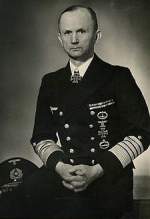
World War II: Saboteurs: Twelve days after Karl Doenitz had become Commander-in-Chief of the German Navy, this memorandum was circulated within the naval war staff in order to clear up certain misunderstandings as to the scope of the basic Hitler Order of 18 October 1942:
From the notice given by the 3rd Section of the Naval Operations Staff on 1 February 1943 it has been discovered that the competent departments of the General Staff of the Army, as well as those of the Air Force Operations Staff, have a wrong conception regarding the treatment of saboteurs. A telephone inquiry at the 3rd Section of the Operations Staff proved that this naval authority was not correctly informed either. In view of this situation, reference is made to Paragraph 6 of the Fuehrer Order of 18 October 1942 according to which commanders and officers who have neglected their duty in instructing their units about the order referring to treatment of saboteurs are threatened with punishment by court-martial.
The first Fuehrer order concerning this matter of 18 October 1942 was given the protection of top secret merely because it stated therein (1) that according to the Fuehrer's views, the spreading of military sabotage organizations in the East and West may have tremendous consequences for our whole conduct of the war, and (2) that the shooting of uniformed prisoners acting on military orders must be carried out even after they have surrendered voluntarily and asked for pardon. On the other hand, the annihilation of sabotage units in battle is not at all to be kept secret; but on the contrary, to be currently published in the OKW reports.
The purpose of these measures to act as a deterrent will not be achieved if those taking part in enemy commando operations would not learn that certain death and not safe imprisonment awaits them. As the saboteurs are to be annihilated immediately, unless their statements are first needed for military reasons, it is necessary that not only all members of the Armed Forces must receive instructions that these types of saboteurs, even if they are in uniform, are to be annihilated but also all departments of the home staff, dealing with this kind of questions, must be informed of the course of action which has been ordered . . . .
The annihilation and destruction, according to Paragraph 5 of the Fuehrer Order of 18 October 1942, do not apply to troops participating in large scale landing operations and large-scale airborne operations. The criterion is to be found in that, in the latter case, an open battle takes place, whereas, for instance, 10 or more people who land by sea or air, or drop by parachute not to fight an open battle but to destroy either a factory, a bridge, or a railway installation, would fall into the category of those who must be annihilated.
Holocaust: One thousand Jews from France, including several hundred children and old people are transported to Auschwitz. All the children are gassed on arrival and only 10 of the others will survive the war. (THP)
1944 Various:
World War II: FDR to Stalin:
I have been following the recent developments in your relations with Poland with the closest attention . . . . I neither desire nor intend to attempt to suggest much less to advise you in any way as to where the interests of Russia lie in this matter since I realize to the full that the future security of your country is rightly your primary concern . . . .
I fully appreciate your desire to deal only with a Polish Government in which you can repose confidence and which can be counted upon to establish permanent friendly relations with the Soviet Union, but it is my earnest hope that while this problem remains unsolved nothing should be done to transform this special question into one adversely affecting the larger issues of future international collaboration. While public opinion is forming in support of the principle of international collaboration, it is essentially incumbent upon us to avoid any action which might appear to counteract the achievement of our long-range objective.
I am told by Prime Minister Churchill that he is endeavoring to persuade the Polish Prime Minister to make a clean-cut acceptance as a basis for negotiation of the territorial changes which have been proposed by your Government . . . the first consideration at this time should be that Polish guerrillas should work with and not against your advancing troops. That is of current importance and as a step of some assurance on the part of all Poles would be a great advantage.
Death: Twenty-two or more Poles hanged in public in the remains of the Warsaw Ghetto:
The demonstrative public hanging . . . was little more than an everyday atrocity in Nazi-occupied Poland, although, ten days after the Gauleiter responsible for previous mass executions had himself been assassinated by the Polish Home Army, it presumably had an extra bit of meaning for the city's denizens. According to Gregor Dallas's 1945: The War That Never Ended,
Nazi terror reached new heights for the non-Jewish population of Warsaw in the winter of 1943-4. People were seized at random in the streets and executed on the spot; between October and February some 270 to 300 men and women were publicly hanged or shot each week: the kind of atrocities the French commemorate in Tulle and Oradour were, in Warsaw, a part of daily life. "On my way to Leszno Church today," Julian Kulski, a young soldier of the Home Army, recorded on 11 February 1944, "I saw a crowd of people standing in front of the Wall. They were gazing at something above the Wall, on the Ghetto side of it. As I got closer, I could see for myself: hanged from the upper-storey balconies of what had been an apartment house were the bodies of twenty-two of our Freedom Fighters." Kulski, at any rate, took them for Freedom Fighters.
1945 Various:

Yalta Conference: On the morning of the last day, Harriman scribbles a note to FDR suggesting a way out of the deadlock over reparations:
The Russians have given in so much at this conference that I don't think we should let them down. Let the British disagree if they want to—and continue their disagreement at Moscow. Simply say it is all referred to the Reparations Commission with the minutes to show the British disagree about any mention of the 10 billion." Harriman will later recall: "Stalin was most insistent that they mention the figure. And Roosevelt gave in on that because, he said, 'This is just a basis for discussion. They have mentioned a figure and we're no worse off recording that they mentioned it.' The principle of the Russians getting fifty percent was not objected to, and the Russians certainly had every right to consider it a reasonable figure. That fifty percent was to plague us at Potsdam. (Harriman)
Yalta Conference: FDR receives a reply from Stalin concerning Assembly votes: "I entirely agree with you that, since the number of votes to the Soviet Union is increased to three ... the number of votes for the USA should also be increased . . . If it is necessary, I am prepared officially to support this proposal." When the provision becomes public knowledge in March, American newspapers will not criticize the extra votes for Stalin, but those for the US. An embarrassed Roosevelt Administration will never actually utilize the extra votes. (Harriman)

The Agreement on the Dismemberment of Germany is signed at Yalta:
It was agreed that Article 12 (a) of the Surrender terms for Germany should be amended to read as follows: The United Kingdom, the United States of America and the Union of Soviet Socialist Republics shall possess supreme authority with respect to Germany. In the exercise of such authority they will take such steps, including the complete dismemberment of Germany as they deem requisite for future peace and security . . . .
It was agreed that a zone in Germany, to be occupied by the French forces, should be allocated France. This zone would be formed out of the British and American zones and its extent would be settled by the British and Americans in consultation with the French Provisional Government. It was also agreed that the French Provisional Government should be invited to become a member of the Allied Control Council for Germany . . . .
1. Germany must pay in kind for the losses caused by her to the Allied nations in the course of the war. Reparations are to be received in the first instance by those countries which have borne the main burden of the war, have suffered the heaviest losses and have organized victory over the enemy.
2. Reparation in kind is to be exacted from Germany in three following forms: (a) Removals within two years from the surrender of Germany or the cessation of organized resistance from the national wealth of Germany located on the territory of Germany herself as well as outside her territory (equipment, machine tools, ships, rolling stock, German investments abroad, shares of industrial, transport and other enterprises in Germany, etc.), these removals to be carried out chiefly for the purpose of destroying the war potential of Germany. (b) Annual deliveries of goods from current production for a period to be fixed. (c) Use of German labor.
3. For the working out on the above principles of a detailed plan for exaction of reparation from Germany an Allied reparation commission will be set up in Moscow. It will consist of three representatives—one from the Union of Soviet Socialist Republics, one from the United Kingdom and one from the United States of America.
4. With regard to the fixing of the total sum of the reparation as well as the distribution of it among the countries which suffered from the German aggression, the Soviet and American delegations agreed as follows: "The Moscow reparation commission should take in its initial studies as a basis for discussion the suggestion of the Soviet Government that the total sum of the reparation in accordance with the points (a) and (b) of the Paragraph 2 should be 22 billion dollars and that 50 per cent should go to the Union of Soviet Socialist Republics.
The British delegation was of the opinion that, pending consideration of the reparation question by the Moscow reparation commission, no figures of reparation should be mentioned . . . . The conference agreed that the question of the major war criminals should be the subject of inquiry by the three Foreign Secretaries for report in due course after the close of the conference.

Stalin then brought up the question of reparations in kind and in manpower, but said he was not ready to discuss the manpower question. The latter, of course, referred to forced labor. Since the Russians were using many thousands of prisoners in what was reported to be virtual slave camps, they had little to gain by discussing the matter. Stalin then had Deputy Foreign Commissar Maisky elaborate on the Russian view of the reparations question.
The proposal in brief was: Reparations in kind should include factories, plants, communication equipment, investments abroad, etc., and should be made over a period of ten years, at the end of which time all reparations would have been paid. The total value of the reparations in kind asked by the Soviet was 10 billion dollars, to be spread over the ten year period. The German heavy industries should be cut down and 80% removed in a period of two years after the surrender. Allied control should be established over German industry, and all German industry that could be used in the production of war material should be under international control for a long period.

The Declaration of Liberated Europe is signed at Yalta:
The establishment of order in Europe and the rebuilding of national economic life must be achieved by processes which will enable the liberated peoples to destroy the last vestiges of Nazism and fascism and to create democratic institutions of their own choice. This is a principle of the Atlantic Charter—the right of all people to choose the form of government under which they will live—the restoration of sovereign rights and self-government to those peoples who have been forcibly deprived to them by the aggressor nations.
To foster the conditions in which the liberated people may exercise these rights, the three governments will jointly assist the people in any European liberated state or former Axis state in Europe where, in their judgment conditions require, (a) to establish conditions of internal peace; (b) to carry out emergency relief measures for the relief of distressed peoples; (c) to form interim governmental authorities broadly representative of all democratic elements in the population and pledged to the earliest possible establishment through free elections of Governments responsive to the will of the people; and (d) to facilitate where necessary the holding of such elections.
The three Governments will consult the other United Nations and provisional authorities or other Governments in Europe when matters of direct interest to them are under consideration. When, in the opinion of the three Governments, conditions in any European liberated state or former Axis satellite in Europe make such action necessary, they will immediately consult together on the measure necessary to discharge the joint responsibilities set forth in this declaration. By this declaration we reaffirm our faith in the principles of the Atlantic Charter, our pledge in the Declaration by the United Nations and our determination to build in cooperation with other peace-loving nations world order, under law, dedicated to peace, security, freedom and general well-being of all mankind. In issuing this declaration, the three powers express the hope that the Provisional Government of the French Republic may be associated with them in the procedure suggested. (Harriman)

The Agreement Concerning Japan is signed:
The leaders of the three great powers—the Soviet Union, the United States of America and Great Britain—have agreed that in two or three months after Germany has surrendered and the war in Europe is terminated, the Soviet Union shall enter into war against Japan on the side of the Allies on condition that:
1. The status quo in Outer Mongolia (the Mongolian People's Republic) shall be preserved.
2. The former rights of Russia violated by the treacherous attack of Japan in 1904 shall be restored, viz.: (a) The southern part of Sakhalin as well as the islands adjacent to it shall be returned to the Soviet Union; (b) The commercial port of Dairen shall be internationalized, the pre-eminent interests of the Soviet Union in this port being safeguarded, and the lease of Port Arthur as a naval base of the USSR restored; (c) The Chinese-Eastern Railroad and the South Manchurian Railroad, which provide an outlet to Dairen, shall be jointly operated by the establishment of a joint Soviet-Chinese company, it being understood that the pre-eminent interests of the Soviet Union shall be safeguarded and that China shall retain sovereignty in Manchuria;
3. The Kurile Islands shall be handed over to the Soviet Union. It is understood that the agreement concerning Outer Mongolia and the ports and railroads referred to above will require concurrence of Generalissimo Chiang Kai-shek. The President will take measures in order to maintain this concurrence on advice from Marshal Stalin. The heads of the three great powers have agreed that these claims of the Soviet Union shall be unquestionably fulfilled after Japan has been defeated.
For its part, the Soviet Union expresses it readiness to conclude with the National Government of China a pact of friendship and alliance between the USSR and China in order to render assistance to China with its armed forces for the purpose of liberating China from the Japanese yoke." Averell Harriman will later recall: "The agreement in no way weakened him (Chiang Kai-shek). Stalin recognized Chiang as the head of the government of China. The formal agreement negotiated with Stalin by Foreign Minister T. V. Soong in July of 1945 promised to respect continuing Chinese sovereignty in Manchuria. If Chiang had been strong enough at home to hold up his end, the outcome may have been different. In my judgment it was Chiang's inherent weakness that gave the Chinese Communists their opportunity. (Harriman)

World War II: Allied Official Communique:
It is our inflexible purpose to destroy German militarism and Nazism and to ensure that Germany will never again be able to disturb the piece of the world. We are determined to bring all war criminals to just and swift punishment and exact reparations in kind for the destruction wrought by the Germans. Yalta Conference: The Big Three sign the official Yalta Communique at lunch. FDR suggests that the host of the conference sign first, but Stalin declines, explaining that it will be said that he had 'led' the conference. Churchill jokingly argues that he should sign first for alphabetical reasons, and the other two agree. Vice Admiral Wilson Brown, FDR's naval aid, talks the president into leaving Yalta immediately in the USS Catoctin. (Harriman)
FDR and daughter Anna leave Yalta Conference:
A week of secret meetings between President Franklin D. Roosevelt, Winston Churchill and Joseph Stalin at the Black Sea port of Yalta ends on this day in 1945, and Roosevelt and his daughter, Anna, begin their journey home. The meeting is Roosevelt's last appearance at an international conference.
As an Allied victory appeared increasingly imminent, The Big Three met to decide the post-war boundaries of Europe and to discuss military strategy. FDR's health had become increasingly delicate since his unprecedented re-election to a fourth term the previous fall and he went into a serious physical and sometimes mental decline as a result of the 7,000-mile trip to Yalta. Churchill's personal physician had observed that Roosevelt suffered from typical symptoms of arteriosclerosis (hardening of the arteries). Only two months later, he would be dead from a stroke. At Yalta, Roosevelt spent what little energy he had left trying to get Stalin to join the U.S. in the Pacific war against the Japanese and in privately reassuring Churchill that he would not give away too much post-war control to the Soviets.
Roosevelt took his daughter, Anna, with him to Yalta instead of his wife, Eleanor, as he and his advisors agreed that Anna would be best able focus on caring for the ailing president. Demands on the globally popular Eleanor would not only risk revealing the secret nature of the meeting, but would drag her away from the necessity of attending a very sick man. Anna also served as Roosevelt's personal assistant and confidant. The president loved gossip and Anna readily supplied it. Apart from overseeing Roosevelt's packed schedule, she also took care of the tiniest details, including making sure there was an even number of guests at the dinner table. Prior to one dinner at Yalta, Anna scrambled to add one more person with appropriate security clearances to a table of 13 in order to placate her highly superstitious father.
The decision to invite Anna annoyed the first lady, though she had rarely joined her husband on similar missions in the past, and it deepened a rift between the couple that had increased steadily as his health failed. Roosevelt's former habit of consulting with his wife in diplomatic matters began to wane and his ill health and her subsequent irritation with him made the normally congenial couple snappish with each other. Upon the successful completion of the conference, Roosevelt sent Eleanor a cursory report that concluded, I am a bit exhausted but really all right. It has been grand hearing from you.
During the journey home, Roosevelt's closest advisor, Harry Hopkins, disembarked at Algiers due to a serious illness, choosing to fly home at a later date. A cranky Roosevelt took Hopkins' departure personally and his failure to forgive Hopkins soured their long-time friendship. To make matters worse, Roosevelt's friend and military aid Pa Watson died of a stroke two days into the return voyage. Roosevelt also felt burdened by the knowledge that his concessions to Stalin would result in Eastern Europe's subjugation to communist control. The combination of these factors drove Roosevelt into further physical decline and depression and he stayed in his cabin for the duration of the voyage. However, in typical Roosevelt fashion, he rallied the day before they docked at Newport News, Virginia, meeting Eleanor and the nation with a sense of optimism. (History.com)
Death: JSH Lokerman: Resistance fighter (in Neuengamme). [See: The Last Days of the Third Reich.]
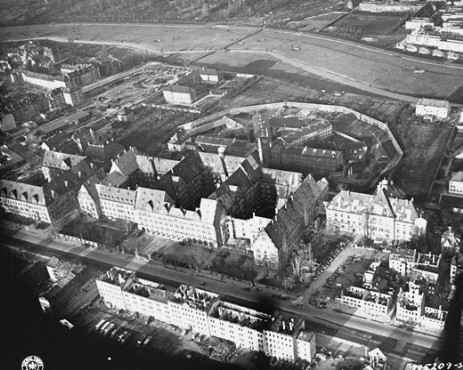
1946 Nuremberg Tribunal: High drama marks this day's proceedings as General Friedrich Paulus, who surrendered the German army at Stalingrad, is brought forward as a surprise witness for the Prosecution:
From the diary of Dr. Victor von der Lippe:The press reporters were all there; supposedly they had been told of Paulus' appearance beforehand. The defense lawyers were more or less taken by surprise. The news of Paulus' presence spread through the courthouse like wild-fire. Everyone rushed to the hearing room so as not to miss the spectacle. (Taylor)

Paulus testifies:
General Rudenko: And one last question: Whom do you consider as guilty of the criminal initiation of the war against Soviet Russia?
Paulus: May I please have the question repeated?
General Rudenko: I repeat the question...
The President: The Tribunal is about to address an observation to General Rudenko. The Tribunal thinks that a question such as you have just put, as to who was guilty for the aggression upon Soviet territory, is one of the main questions which the Tribunal has to decide, and therefore is not a question upon which the witness ought to give his opinion. Is that what Counsel for the Defense wish to object to?
Dr Laternser: Yes, Mr. President, that is what I want to do.
General Rudenko: Then perhaps the Tribunal will permit me to put this question rather differently.
The President: Yes.
General Rudenko: Who of the defendants was an active participant in the initiation of a war of aggression against the Soviet Union?
Paulus: Of the defendants, as far as I observed them, the top military advisers to Hitler. They are the Chief of the Supreme Command of the Armed Forces, Keitel; Chief of the Operations Branch, Jodl; and Goering, in his capacity as Reich Marshal, as Commander-in-Chief of the Air Forces and as Plenipotentiary for Armament Economy.
General Rudenko: In concluding the interrogation I shad make a summary. Have I rightly concluded from your testimony, that long before 22 June the Hitlerite Government and the Supreme Command of the Armed Forces were planning an aggressive war against the Soviet Union for the purpose of colonizing the territory of the Soviet Union?
Paulus: That is beyond doubt.
[For the full text of today's proceedings, Click here.]
During the afternoon intermission, the military section blew up in an uproar, and they argued with heated invective with their attorneys and each other. "Ask that dirty pig (Paulus) if he's a traitor! Ask him if he has taken out Russian citizenship papers!" Goering shot at his attorney. Raeder saw me watching and shouted at Goering, "Careful! The enemy is listening!" Goering kept right on shouting to his attorney, and there was real bedlam around the prisoners dock. "We've got to disgrace that traitor," he roared. Keitel was still arguing with his attorney, and Raeder passed him a note with the same warning. At the other end of the dock, the attitude was more sympathetic to von (sic) Paulus. "You see," said Fritzsche, "that is the tragedy of the German people. He was caught between the devil and the deep blue sea." (Gilbert)
1947 Wunderwaffen: By around this time, the Soviets complete the transfer of all rocket technology from East Germany into secret locations in the USSR. (Menaul) [See: Where Would We Be Without Hitler's Scientists?]
1956 Cold War: Burgess and Maclean resurface:
Donald Maclean and Guy Burgess, former members of the British Foreign Office who had disappeared from England in 1951, resurface in Moscow. Their surprise appearance and formal statement to the press put an end to one of the most intriguing mysteries of the early Cold War.
Maclean and Burgess had been senior officials in the British Foreign Office and in 1951, they seemed to disappear without a trace. There were rumors that they had been spies for the Soviet Union and had left England to avoid prosecution. For five years, nothing was heard of the pair. British intelligence suspected that they were in the Soviet Union, but Russian officials consistently denied any knowledge of their whereabouts.
On February 11, 1956, the pair invited a group of journalists to a hotel room in Moscow. Burgess and Maclean were there to greet them, give a brief interview, and hand out a typed joint statement. In the statement, both men denied having served as Soviet spies. However, they very strongly declared their sympathy with the Soviet Union and stated that they had both been "increasingly alarmed by the post-war character of Anglo-American policy." They claimed that the decision to leave England and live in Russia was due to their belief that only in Russia would there be "some chance of putting into practice in some form the convictions they had always had." They were convinced that the Soviet Union desired a policy of "mutual understanding" with the West, but that many officials in the United States and Great Britain were adamant in their opposition to any working relationship with the Russians. They concluded by stating, "Our life in the Soviet Union convinced us we took at the time the correct decision."
While the surprise news conference solved the mystery of where Burgess and Maclean had been for the past five years, it did little to settle the question of why they had gone to the Soviet Union in the first place. Their statement also did not clear up the issue of whether or not they had spied for the Soviet Union. Evidence from both British and American intelligence agencies strongly suggested that the two, together with fellow Foreign Office workers Kim Philby and Sir Anthony Blunt, had engaged in espionage for the Russians. Both men spent the rest of their lives in the Soviet Union. Burgess died in 1963 and Maclean passed away in 1983. (History.com)
1979 Iran:

The Pahlavi dynasty of Iran effectively collapses when the military declares itself "neutral" after rebel troops overwhelm forces loyal to Shah Mohammad Reza Pahlavi in armed street fighting. [For further information, click here.]
Edited by Levi Bookin (Copy editor)
levi.bookin@gmail.com



Click to join 3rdReichStudies



Disclaimer: This site includes diverse and controversial materials--such as excerpts from the writings of racists and anti-Semites--so that its readers can learn the nature and extent of hate and anti-Semitic discourse. It is our sincere belief that only the informed citizen can prevail over the ignorance of Racialist "thought." Far from approving these writings, this site condemns racism in all of its forms and manifestations.
Fair Use Notice: This site may contain copyrighted material the use of which has not always been specifically authorized by the copyright owner. We are making such material available in our efforts to advance understanding of historical, political, human rights, economic, democracy, scientific, environmental, and social justice issues, etc. We believe this constitutes a "fair use" of any such copyrighted material as provided for in section 107 of the US Copyright Law. In accordance with Title 17 U.S.C. Section 107, the material on this site is distributed without profit to those who have expressed a prior interest in receiving the included information for research and educational purposes. If you wish to use copyrighted material from this site for purposes of your own that go beyond 'fair use', you must obtain permission from the copyright owner.
Please Note: The list-owner and the moderator of 3rdReichStudies are not responsible for, and do not necessarily approve of, the random ads placed on our pages by our web server. They are the unfortunate price one pays for a 'free' website.